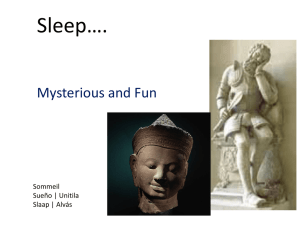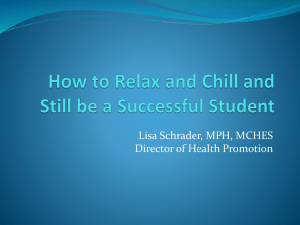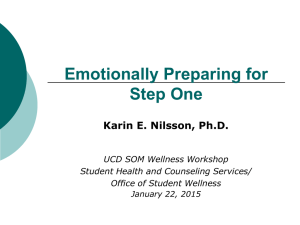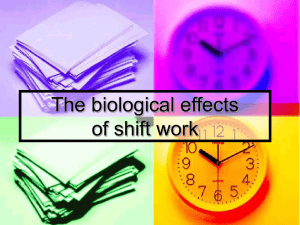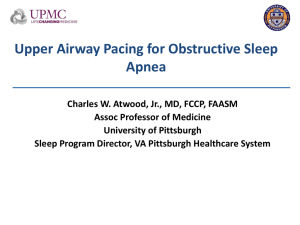Consciousness Powerpoint
advertisement
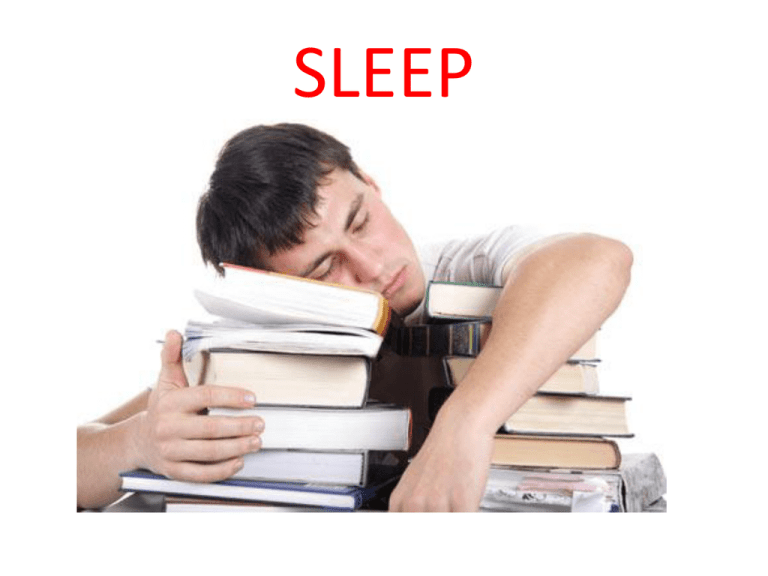
SLEEP EEG Patterns: Measuring Brain Activity The Stages of Sleep: Slow Wave Sleep (SWS) • STAGE 1: Drowsy; alpha activity; easily awakened • STAGE 2: Sleep spindles; sound asleep, but easily awakened • STAGE 3: Delta Waves (20-50% of record); hard to wake up; decrease in blood pressure, body temp, muscle tone, heart rate • STAGE 4: Deep Sleep; almost continuous Delta Waves; difficult to wake up; seldom move The Stages of Sleep: REM Sleep • Rapid Eye Movements • Vivid Dreaming • Paradoxical Sleep: Brain Wave Patterns look alert; Theta Wave Spikes in record • Complete loss of muscle tone The Sleep Cycle Theories of REM Sleep & Dreaming • Freudian Theory (Manifest vs. Latent Content) • Activation-Synthesis Theory (Cortex tries to make sense of random brain activity) • Neurocognitive Theory (Dreams are the result of thinking under unusual circumstances) Why Do We Sleep? • We don’t really know, but some theories: – Brain Development; Solidify information from the day – Repair & Restoration Theory: Restore homeostasis to brain chemistry – Evolutionary or Energy Conservation Theory: We sleep to conserve energy & avoid danger Effects of Sleep Deprivation • No major effects up until 24 hours • Depression, lethargy, decline on task performance, especially vigilance tasks • Prolonged deprivation (>120 hours) can lead to hallucinations & psychotic behavior • Repeated REM deprivation leads to irritability • Metabolic processes remain largely unaffected Sleep Disorders • • • • • • Insomnia Narcolepsy Cataplexy Sleep Apnea Night Terrors, Sleep Walking Periodic Limb Movement Disorder – (Restless Leg Syndrome) Routes to Altered States of Consciousness • • • • Drugs Meditation Hypnosis Nonchemical Environmental Pathways Sensory Deprivation Studies Sensory Deprivation Studies R.E.S.T: Restricted Environmental Stimulation Technique R.E.S.T: Restricted Environmental Stimulation Technique Sweat Lodges Navajo Sweat Lodge Crow Sweat Lodge Factors that May be Operating in Extreme or Unusual Environments *Intense or Novel Sensory Stimulation *Trauma from Accidents *Weightlessness, Pressure Changes *Extreme Temperatures or Hypothermia *Restricted Vision, Hearing, Smell *Lack of Social Stimulation *Monotonous Sensory Stimulation from Landscapes or Seascapes The Sensed Presence A perception or feeling that another Person is present, usually to help. Can range from a vague feeling to A flesh & blood entity May be a god, spirit, ancestor, Or person known to observer. Why Does a Sensed Presence Appear? • Motion of Boats • Atmospheric/Geomagnetic Activity • Changes in brain chemistry triggered by: – – – – Stress Lack of oxygen Monotonous stimulation Buildup of hormones • Shifting of attention from external, ambient stimuli to internal information we have less experience processing.

